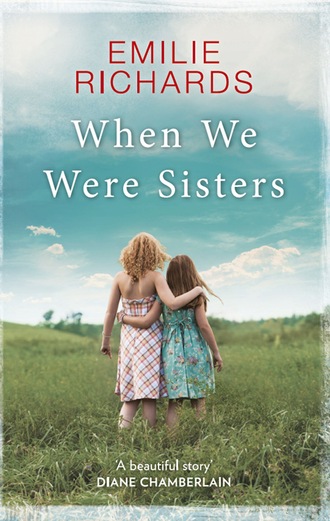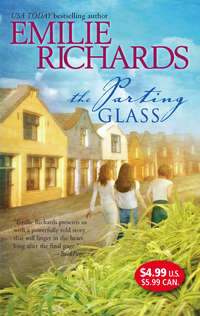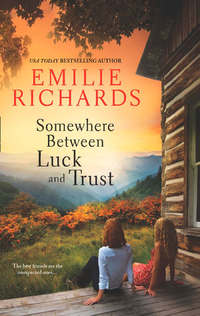
Полная версия
When We Were Sisters
I’m not sure why the neighborhood children always found our house so appealing. But as Nik and Pet grew, we were usually the center of activity. We had no basement rec room, as all of them did, with built-in bars and home theaters. But the sunroom was open to our kitchen, and snacks and drinks were always in easy reach, along with games, both board and video, and pillows and blankets to make tunnels. And outside? Outside we’d splurged on climbing equipment and a wooden playhouse that could be a fort or a palace.
I miss the comings and goings, the slamming of doors, the chatter, but today I was glad for the silence.
I poured myself a glass of ice water, took two ibuprofen and went to join Cecilia outside. My head was pounding, but the nurse had warned me I might have headaches for the next few weeks. She had also warned me not to miss the appointments she would schedule for me, but she had agreed to let me leave the hospital. I don’t know what Cecilia said to her, but I won’t be shocked if my sister makes a surprise appearance at their next benefit.
“It’s so pretty out here.” Cecilia was staring at our glimpse of the distant Catoctin Mountain ridge. “And your garden is spectacular, as always.”
As a young teenager I had helped our sunken-cheeked foster mother grow vegetables on a Florida ranch. Those memories include insects, snakes, hot sun beating on the back of my neck and bare arms, so I never expected to like gardening. But when I arrived at this house, I knew immediately that Kris and I would create garden rooms, defined by shrubs and perennial borders. I’ve made this garden happen, and yes, now it surrounds the house and often stops traffic.
I lowered myself to the glider beside her. “I’m always a little relieved when winter heads this way. Then the only real gardening chore is leafing through seed catalogs.” I pointed to her glass. “Aren’t you hungry?”
“You don’t have to take care of me.”
“Good, I’m not sure what’s in the fridge. I’ve only been gone two days, but Kris and the kids might have filled it with doughnuts and lunch meat.” Although, of course, that would mean that my husband had gathered himself to visit the grocery store, and I’m not sure he even remembers how to find it.
“Do you know where the kids went after school?” Cecilia asked.
“Kris was hoping to find a neighbor who would watch them when they got home today. I gave him a couple of names.”
“They’ll be glad to see you’re out of the hospital.”
I hoped it was true, but it seemed like a long time since my children had been glad to see me. “They’re growing up, CeCe. Mom is no longer the center of their lives. They’re breaking away big-time.”
“That’s natural.”
“I’m not sure.” I sipped my water and considered. Cecilia knows I talk in spurts and it’s never easy.
“The thing is,” I said, putting the glass on the table in front of us, “it seems to be more about anger than breaking away. I have to be good guy and bad guy, helper and tormentor. I’m the one who tells them how great an A is and the one who has to let them know it’s not all right when they don’t do homework or study. It’s always something, and I’m always right here taking care of it. Nobody else is around to deliver bad news.”
It was as close to an indictment of Kris as I’d ever made in Cecilia’s presence. I was immediately sorry. She didn’t need more ammunition against him.
“Maybe they aren’t angry at you.”
“Angry at the world?” I shrugged.
“Angry at their father for not being around while they’re growing up.”
I started to protest but didn’t get far. Because I know that Nik, in particular, needs more time with Kris. He’s twelve, tall and gangly and, according to his pediatrician, already into puberty. We started the “birds and the bees” discussion years ago in this garden, where the birds and the bees are actual residents, but the last thing my son wants now is to talk about sexual feelings or his changing body with his mother. And when can he talk to his father? Not on the fly during the rare times when Kris drops him at school on his way into work. Not late at night when Kris stumbles home so exhausted he can hardly remember his own name.
“It’s a problem,” I said. “Kris is a hot commodity. We don’t see a lot of him.”
She wisely didn’t follow up on that, at least not exactly. “Remember the night of the accident, when we chatted and I told you I needed to talk to you about something?”
I thought back and was glad I could remember. “You told me not to put you off.”
“Do you remember when I was in Australia on tour?”
“You got the flu and laryngitis and had to cancel the last week or so of concerts, right? Every time I called, Donny said you were fine but resting your voice.”
“I had a...” She angled her body toward me so she could see my face. “I had what they used to call a nervous breakdown. Now whatever they call it comes down to long paragraphs of psychobabble. But in essence, I had about a month when I couldn’t function. I was in a hospital for two of those weeks.”
“CeCe...” I covered her hand with mine. “Why didn’t you tell me?”
“What would you have done? Flown to Australia? Worried? Besides, I had to deal with my problems on my own. I needed time to cry and think. I did a lot of both.”
I didn’t know what to say. Cecilia is the strongest person I know, but even strong people can snap under the right pressure.
“A lot of it was exhaustion,” she said. “I chopped the old candle into a thousand pieces and burned every one of them at both ends. There was a doctor there I liked, a woman, Dr. Joan. She said that anybody who works as hard as I do is always avoiding something.”
“What were you avoiding?”
“You know better than anybody. Where I come from. Who I was. Who I am now. What I never had. The whole nine yards.”
“Most people would find even one of those topics intimidating.”
She laughed a little. “Devoted to making everything as momentous as possible. That’s me.”
Even without makeup, even wearing a man’s loose dress shirt, Cecilia is beautiful. She hasn’t always been. She grew slowly into her quirky, oversize features, but by the time she turned eighteen her carroty hair had darkened to a spectacular auburn and her figure had ripened into something astonishing. She’s lovely up close, but onstage? Onstage she’s a goddess.
“How are you now?” I asked, because to look at her, no one would know she’d ever experienced turmoil, much less recently.
“Determined.”
“You’re always determined. You’ve been determined since the day we met. You always have a plan.”
“This is a little different. Before I was determined to remake myself, to pretend I was somebody else. Now I’m determined to let the world know who I really am.”
I was puzzled. Mystique is a part of celebrity, and Cecilia already shares so much with her audiences. She’s loved for her energy and her ability to make her fans feel as if they know her. But, of course, they don’t know her at all.
She stood and went to the railing, turning to face me. “Almost two years ago a film producer named Mick Bollard contacted me. Do you know the name?”
“The same Mick Bollard who makes the award-winning documentaries?”
“I figured you would know.”
Once upon a time I was a professional photojournalist. But even if the path of my life veered away from the profession I once loved so well, I do keep up with my colleagues.
“I may not have seen everything, but I’ve seen most of his work,” I said.
“He told me he was doing a documentary on the foster care system, and he was looking for someone to narrate, someone famous to feature. He wanted a celebrity who had been a foster child, somebody to convey what the experience is like from a child’s point of view. He thought that would be a draw for the audience, but also a testament to how foster children can triumph.”
Cecilia has never flaunted her past, but neither has she hidden the basics, partly because it’s not easy to hide anything when hungry journalists are looking for a story. I’m always impressed by how well she feeds information to the press without whetting their appetites or lying outright.
“What did you tell him?” I asked.
“I said no.”
That didn’t surprise me, and it probably hadn’t surprised Mick Bollard. “Did he refuse to take no for an answer?”
“Actually he was understanding. That was the end of it until I got home from my Australian adventure. I started thinking about confronting my demons, and I got back in touch with Mick. We got together. I told him my entire history.”
I whistled softly. That alone had to be a first.
“Yes, I know,” she said. “He was fascinated. He went back to his hotel, and the next time I saw him he had moved well beyond what he’d first asked for. Now he wants to focus a large portion of the documentary on my childhood. Since you know his films, you know how that will work. We’ll go back to the places that were important in my personal story. I’ll be on camera, telling the audience what I remember. He’ll intersperse those segments with footage he already has, historical photographs and videos, interviews with social workers and the directors of innovative programs, and then he’ll shoot more footage, closer looks at the child welfare system I grew up with and where it is now.”
I could picture it. And having Cecilia sharing her own life on camera? What it had been like to be an actual foster child, maybe even what her life had been like before the state took over? Done well, this could win awards. And nobody would do it as well as Mick Bollard.
“Will this help or hurt your career?” It was the next logical question.
“I don’t know.”
“What does Donny say?”
“Donny says what matters is whether I think it will help or hurt me.”
I’ve always liked Cecilia’s manager, who isn’t quite the shark his colleagues are. I liked him more now. “And what do you think?”
“I think I need to do this.” She leaned forward. “And Robin, I really think you need to do it with me.”
5
Kris
I’m the younger of two children; my sister, Lucie, is six years older, and we rarely fought. Lucie doted on me and thought it was hilarious when I tried to argue. I was the crash-test dummy for the parenting skills she would need later in life with her own four children. Consequently, when my children fight, I have no clue how to respond. My usual reaction is to respond badly.
“Cut it out,” I said when the shrieking in my car reached a painful pitch. “What’s wrong with you two? Can’t you just let go of this and move on?”
Pet, who looks enough like Robin to confirm that the hospital sent us home with the right baby, was close to sobbing. “But that’s my notebook, Daddy. Nik stole it from my desk.”
“I didn’t steal it. You took it out of the supply cupboard and hid it, and I had to go into your desk to find it. But it’s not really yours, because you aren’t even using it. I need it.”
“Put the damn notebook on the dashboard. Now!” I took a breath and lowered my voice. “Really? A spiral notebook is so important you’re screaming at each other? Put it on the dashboard right now, Nik.” Or else was clear.
“Whatever.”
My son’s voice is deepening. I hadn’t noticed this until yesterday, but he is moving from childhood to adolescence, and not gracefully if today is any example. He and Pet both realize they nearly lost their mother two nights ago, but neither has said a word about it to me. Instead their fighting has gotten worse, as if their mother’s brush with death was a hiccup.
The coveted notebook thumped against the dashboard, and Nik, in the seat beside me—the death seat, according to Cecilia—folded his arms. I glanced at the notebook and understood the fight. Rock Star was emblazoned across the front.
Cecilia again.
I sighed and glanced at my son. While Pet resembles her mother, Nik has my dark blond hair and greenish eyes. I’m not sure where his features come from, but even at twelve, they work together nicely.
“When we get home, we’ll flip a coin,” I said, adding when they began to protest, “Or I will dump the notebook in our recycling bin. Got it? You two decide.”
Stony silence ensued until we were just a couple of miles from home. I broke it. “What kind of pizza do you want tonight?”
“We had pizza last night.” These days Nik has turned sullen into an art form.
“We had pizza last night because your mother is in the hospital. Remember your mother? The woman who normally cooks for you? We had pizza because she wasn’t there to cook for you yesterday, nor is she there to cook for you today. And since we live too far out of town for any other kind of delivery, we will happily eat pizza again so we can leave early enough to visit her at the hospital. Since I couldn’t get you there last night.”
Now I was close to screeching. I let seconds pass before I spoke again. “Look, I’m sorry. It’s been a tough couple of days.”
“Sure. All that work and kids to take care of, too. Who could stand the pressure?”
“You’re such a turd, Nik,” Pet said from the backseat. “Leave everybody else alone, okay? Can’t you be miserable on your own?”
“Stop it, both of you.” I tried again. “Whether either of you has said a word about it or not, I’m sure you’re both worried about your mom.”
“She’s going to be fine. You said so,” Nik said, as if this was the most boring information in the universe.
“She is, but the whole thing is a shock. The accident. Mrs. Weinberg.” I didn’t know what else to say. Feelings are not my strong suit.
“Yeah, well, it’s all over and done with. Can’t we just move on?” he said in imitation of me.
I had an inkling, just an inkling, of why parents snap and hit their children. I tried again. “I know you were there when the police called Michael—Mr. Weinberg. It must have been hard.”
“Yeah, that’s what you said the night it happened. It was harder for Mr. Weinberg, don’t you think? And for Channa?”
“Hard for everyone, Nik, of course, but especially them.”
“Channa didn’t even cry,” Pet said.
“She was in shock, stupid,” Nick snapped back.
“Well, I was in shock and I cried anyway.”
I let the name-calling pass this once. “In a crisis everybody reacts in different ways. There’s no good or bad way.”
“What’s your way?” Nik said in a tone that made it clear he really didn’t care. “Staying away from funerals? Working harder?”
“You’re about one second away from a week without television.”
“Who cares?” Nik turned his head toward the window to watch the passing scenery.
Nik has never been an easy kid. As a baby he had colic, and by the time he grew out of it Robin swore she would never give birth again. We skated on smooth ice through age two, which is why Pet was conceived, but three was a nightmare. That’s been Nik’s pattern, a good year or two, followed by a dark period when nothing feels right to him. He’s a sensitive kid and notices everything. And he lives for justice. Robin says he’ll be a lawyer, too.
If he is, I hope he loves the work more than I do.
“We’ll go to shivah tomorrow.” I had already explained that Talya’s family would stay at home for seven days to receive guests and we would be expected to be among them. “I wish I hadn’t missed the funeral, but we’ll let Mr. Weinberg and the family know how sorry we are tomorrow night.”
“I don’t want to go,” Nik said.
“Me, either,” I said. “But this isn’t about us—it’s about them.”
For once he didn’t argue.
The rest of the trip was blessedly silent. I parked in the garage that Robin and I added when we extended the house. Those days, far behind us now, were golden. Redesigning with our architect, watching the future come together one expanse of cedar at a time, imagining the years in front of us. Robin was right on-site through the noise and confusion, but she made friends with our crew and insisted she didn’t mind. Sometimes when I came home in the evening I found the men still sitting around our temporarily relocated dining table, going over plans for the next day while they drank a well-deserved beer.
Robin seems shy at first, but she loves anybody who loves her back. That’s not hard to do.
“We can do wings with the pizza if you’d like,” I said as we got out of the car. Concessions can work wonders at home as well as the negotiating table.
“Maybe we should get a salad?” Pet asked.
Nik whistled. “Wow, Mom’s little helper. And she’s not even home to know how good you are.”
Only she was home. We opened the door, and Robin was right there, waiting for us. For a moment I didn’t know what to say.
“They let me out for the funeral,” she said, holding out her arms. “And here I am.”
Pet leaped forward for a hug. If I’d had any doubts my daughter cared what had happened, they were allayed immediately. She was sniffing back tears.
“Hey, I’m okay,” Robin said. “Really. How are you?”
Pet pulled away. “Mad at you!”
“I’m sure. And, Nik, you’re okay?”
“Why wouldn’t I be?”
I stopped staring at my wife to glance at my son. His voice had cracked, just a little, and his expression wasn’t as steely as he probably hoped.
“Indeed,” Robin said lightly. She finally looked at me. “Cecilia’s here. She baked a file in a cake and sprung me.”
I really should have expected that, but I had been so busy absorbing everything else I hadn’t gotten around to processing details.
Cecilia. Of course.
I made what passed for a protest. “You were supposed to stay in the hospital until tomorrow.”
“Yes, and isn’t it nice I’m home instead?”
“If you’re actually well enough to be.”
“I’m standing here smiling at you, aren’t I?”
She was expecting something, and I realized it wasn’t an apology for missing the funeral. At least not yet. I moved forward to hug her, too. She felt like a bird in my arms, her robin namesake, fragile and ready to take flight.
“I’m just worried about you, that’s all,” I said, stroking her hair. “And who did Cecilia pay to get you out ahead of time?”
“I don’t even care. I’ll do the rest of the tests as an outpatient this week, but there’s no reason to worry. Everything looks fine.”
“We’re having pizza for dinner again,” Nik said. “And we even get to pick what kind.”
I was still holding Robin, but I could almost hear my son rolling his eyes.
“Actually we aren’t,” she said. “Donny’s been set loose to find and retrieve dinner. And he’ll pick up food to take to the Weinbergs’ while he’s at it.” She pushed away. “Were you planning to go next door tonight or tomorrow?”
Only then did I finally note the anger simmering behind her smile.
“I got held up in traffic, Robin. I tried to get to the funeral in time.”
“You got held up in a meeting first.”
“You were checking on me?”
“Oddly enough I needed reassurance that one of us would be there for the Weinbergs.”
“One of us was. Even though she shouldn’t have been.”
“One of us felt strongly enough to make it happen.” She closed her eyes a moment, as if to wipe out the anger. “Come say hello to Cecilia. She’s flying out tonight, so she’ll only be here for dinner.”
The kids had already galloped off to find her. They love my sister, Lucie, but Cecilia’s their favorite aunt and Pet’s godmother to boot. And why not? She never arrives without posters signed by the pop group of the month, CDs not yet released to the public, swag from her Grammy gift bag. One year she gave Nik glasses with a frame of blinking lights that she swore Elton John had worn on tour.
“I’m sorry,” I said, now that we were alone. “I’m dancing as fast as I can, but I should have walked out of my meeting sooner.”
“You’re going to have to learn how to, Kris. Because you’re going to be needed at home for the next few months.”
“I do my best.”
“Well, you’ll have to do even better. Because it’s possible I won’t be around for a while to take up your slack.”
Before I could ask what she meant, she disappeared, too.
6
Robin
I’m not sorry I can’t remember details of the crash that killed Talya, but I would be devastated if I couldn’t remember the day I met Cecilia.
I was nine, and Cecilia was thirteen. My grandmother had just died, and while therapists tell you that children mourn the loss of even the worst caretakers, I can tell you it’s not always true. Yes, I was frightened my new life might be even harder. I was so frightened, in fact, that once again I lost the power of speech. But I wasn’t sorry that Olive Swanson was gone from my life. I can’t remember my mother, who vanished before I was two, but I’ll never forget my grandmother.
Years after Olive’s death, when my case manager decided I needed to know about my past, I learned why my mother hadn’t wanted me. Details are sketchy, but it seems likely I was the child of date rape, not that the term was often used in 1978, when I was born. But from information a social worker gleaned as my grandmother lay dying, at fifteen my mother, Alice, sneaked out of the house to meet a boy, who reportedly refused to take no for an answer.
My mother was almost five months pregnant before my grandmother figured out why she was gaining weight. By then it was too late for an abortion, but Olive wouldn’t have allowed one anyway. Clearly Alice needed to suffer the full consequences of her disobedience, and Olive demanded she continue to attend school until I was born, even though the other kids probably made that hell.
Afterward, when Alice wanted to place me for adoption, Olive took custody instead, most likely so I would be a constant and visible reminder of her daughter’s sin.
I don’t think Olive believed my mother would have the courage to leave home, but immediately after graduation Alice disappeared for good. Olive transferred her disdain from her daughter to me.
The foster home where I was taken the day Cecilia and I met wasn’t the first I’d lived in. Olive was ill for almost two years before she died, and at the first sign of cancer she had surgery. Since there was no family to take care of me, I was placed in care until my grandmother was able to resume custody. Each subsequent time she was hospitalized I became a foster child again until she was well enough to claim me once more.
Prior to Olive’s illness, I slowly became mute. Normal speech, which my medical records claim I developed as quickly and normally as any child, almost disappeared. To combat this, my grandmother did her best to scare words out of me. I was sent to doctors and speech therapists, but any progress I made disappeared at home.
Of course the explanation is simple. Nothing I had to say was welcome or correct. Why speak when I would be instantly challenged or shamed? Selective mutism was a simpler solution.
To make matters worse I was painfully shy and terrified of new situations, even though I badly wanted to escape my daily life. I was frightened that everyone would treat me the way Olive did, so I rarely made eye contact and preferred escaping to places where nobody could judge me, often inside my head.
Olive was a great believer in diagnoses but not in therapy. She simply wanted an excuse for the way I behaved. One psychiatrist labeled me autistic, but once I began first grade I excelled at written work and scrupulously followed the most complicated directions, disproving that diagnosis, which was then traded in for the more generic “depression.” This one, with its finger pointed straight at my grandmother, surely pleased her less.
Rather than being traumatized during Olive’s hospitalization, I began to interact with other foster children and to slowly speak again. Not often or fluently, but well enough to get by. Each time my grandmother underwent more treatment, my speech temporarily improved. Each time I went home again I regressed.
My grandmother died when I was nine. I had been placed in emergency care two weeks earlier when she was rushed to the hospital. Just before she passed away I was taken there to say goodbye. I brought flowers the sympathetic foster mother and I had picked from her garden. Olive took one look at them and me, then turned toward the wall to block out the sight of such a common gift and useless child. My foster mother explained that my grandmother was too sick to know what she was doing. But I knew better.










